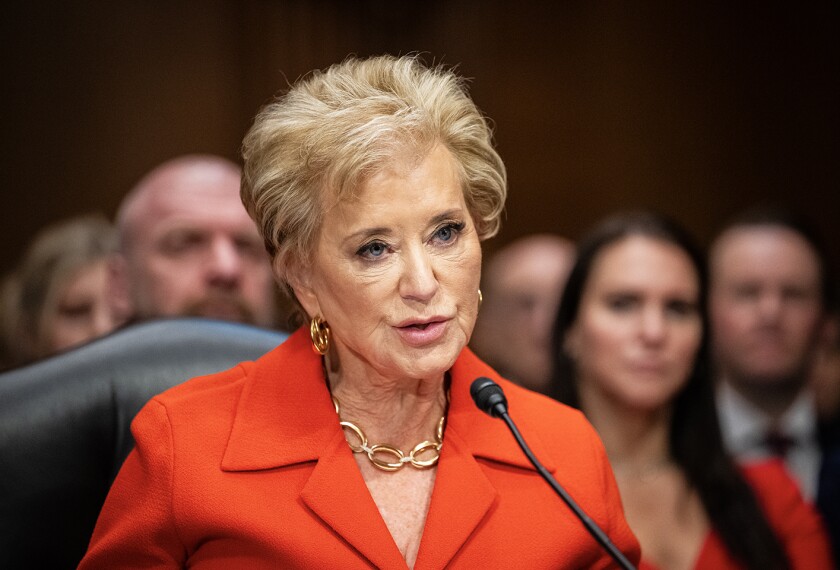Republican leaders on the House Education and Labor Committee are eyeing part of the final regulations for the economic-stimulus program’s Race to the Top Fund that they say could lead to a de facto national curriculum—and even a national test.
In competing for $4 billion in Race to the Top grants—available under the federal stimulus law to reward states for making progress in boosting student achievement—states are encourged to take part in an effort to develop common academic standards.
Right now, the only effort that fits that description is the Common Core State Standards Initiative, spearheaded by the Council of Chief State School Officers and the National Governors Association.
So far, 48 states have signed on to that push for a more uniform set of standards, although it’s unclear how many will remain on board once the effort is complete some time next year. The U.S. Department of Education is also planning to use $350 million in Race to the Top money to help states develop common tests.
In allowing states to earn points toward a Race to the Top grant by taking part in the common-standards movement, the department has “transformed [the common-core effort] from a voluntary, state-based initiative to a set of federal academic standards with corresponding federal tests,” said Rep. Glenn Thompson, R-Pa., at a hearing of the House education committee Dec. 8 that examined the CCSSO-NGA effort.
Rising Concerns
At a hearing earlier this year, Democrats and Republicans on the committee agreed that Congress and the federal Education Department should largely let states take the lead in developing common standards. (“House Panel Considers Federal Role in Standards,” April 29, 2009.)
It’s clear that some lawmakers now regard provisions in the regulations for the Race to the Top program, which is part of the American Recovery and Reinvestment Act, as a federal intrusion.
And it appears that some local officials agree. Cathy Allen, the vice chair of the board of education of the 16,900-student St. Mary’s County, Md., public schools, seconded Mr. Thompson’s concerns in her testimony before the committee.
“We do have some reservations with what appears to be greater coercion from the federal government in adopting [common standards],” she said, citing the Race to the Top regulations, which were made final last month. (“Rules Set for $4 Billion ‘Race to Top’ Contest,” Nov. 18, 2009.)
Ms. Allen, who serves as the president of the Maryland School Boards Association, said her state already has invested a great deal in its current system of standards and assessments, and has provided professional development for teachers to implement them.
“To now take that and set it aside when we have reached so far would be quite a challenge,” she said.
Gene Wilhoit, the executive director of the CCSSO, who also testified before the committee, agreed that the effort should remain state-led. But he said the federal government could help bolster it, for instance by helping to finance research around standards.
Effect on Rigor
Some House lawmakers suggested the initiative could help address the frequent criticism that the 8-year-old No Child Left Behind Act, the latest reauthorization of the Elementary and Secondary Education Act, allows states to set their own academic standards.

That policy inadvertently encourages states to reduce rigor so that they can clear achievement targets, said Rep. George Miller, D-Calif., the chairman of the education committee and an author of the NCLB law.
As a result, “the quality of education a student may receive is left up to their ZIP code. It’s a matter of geographical luck,” he said. “Having 50 different standards in 50 different states undermines America’s education system.”
But Rep. Judy Chu, D-Calif., said she was worried that the CCSSO-NGA initiative could prompt states with high standards on the books, such as California, to lower them.
“How would your initiative address states with higher standards?” she asked.
In response, Gov. Bill Ritter of Colorado, who heads the NGA’s committee on education and testified before the House committee, said the initiative is aiming high.
“We’ve demanded rigor. … We’ve tried to make it so these standards are such that states’ [current standards] don’t fall above them,” he said. He added that the standards are not fully completed yet, so it’s premature for any state to say its standards are more rigorous than those that will be developed by the common-core initiative.
Gov. Ritter, a Democrat, also implied he doubted that the federal Education Department would penalize a state in the Race to the Top competition for going above and beyond the suggested voluntary standards. The U.S. secretary of education “is not demanding 100 percent compliance with these standards,” he said.
But at least one lawmaker is concerned that the prospect of Race to the Top grants, which could range from $20 million to $700 million, depending on a state’s size and other factors, may not enough to entice states to adopt the common standards once they have been drafted.
Rep. Dina Titus, D-Nev., said that in her state, “we have a huge fight about whether to repeal” a law prohibiting the linking of student test scores with teacher-effectiveness data in order to make the state eligible for the Race to the Top competition. States that have bans on making such links are automatically disqualified from receiving a grant.
Rep. Michael N. Castle, R-Del., meanwhile, worried that if the common-core effort results in a uniform assessment—a definite possibility in Gov. Ritter’s view—the effort could be derailed. The congressman—a former governor who is running for the U.S. Senate next year—said that while a common test might not be a bad idea, governors might not relish the idea of being measured using the same yardstick.
“Political concerns could get in the way,” Mr. Castle said, including re-election efforts.









